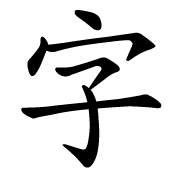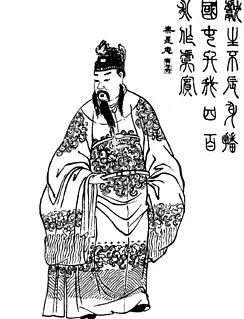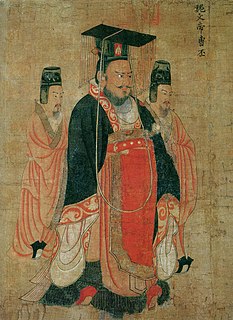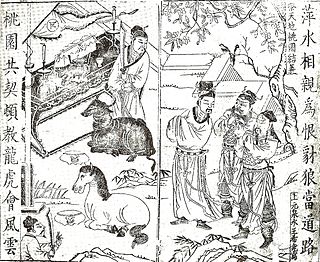
Romance of the Three Kingdoms or Sanguo Yanyi is a 14th-century historical novel attributed to Luo Guanzhong. It is set in the turbulent years towards the end of the Han dynasty and the Three Kingdoms period in Chinese history, starting in 169 AD and ending with the reunification of the land in 280.

Xun Yu (163–212), courtesy name Wenruo, was a strategist and statesman who served as an adviser to the warlord Cao Cao during the late Eastern Han dynasty of China.
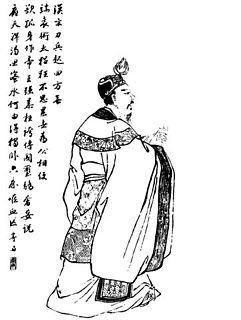
Yuan Shu, courtesy name Gonglu, was a warlord who lived in the late Eastern Han dynasty of China. He rose to prominence following the collapse of the Han central government in 189.
Xun You (157–214), courtesy name Gongda, was a statesman who lived during the late Eastern Han dynasty of China and served as an adviser to the warlord Cao Cao. Born in the influential Xun family of Yingchuan Commandery, Xun You was recruited into the civil service by the general He Jin. When the warlord Dong Zhuo hijacked and controlled the Han central government between 189 and 192, Xun You plotted with four others to assassinate him but was discovered and imprisoned. Following his release after Dong Zhuo's death, he wanted to serve as the Administrator of Shu Commandery but eventually settled as an official in Jing Province.

Jia Xu, courtesy name Wenhe, was an official of the state of Cao Wei during the early Three Kingdoms period of China. He started his career in the late Eastern Han dynasty as a minor official. In 189, when the warlord Dong Zhuo took control of the Han central government, he assigned Jia Xu to the unit led by Niu Fu, his son-in-law. In 192, after Dong Zhuo was assassinated by Lü Bu, Jia Xu advised Li Jue, Guo Si and Dong Zhuo's loyalists to fight back and seize control of the imperial capital, Chang'an, from a new central government headed by Lü Bu and Wang Yun. After Li Jue and the others defeated Lü Bu and occupied Chang'an, Jia Xu served under the central government led by them. During this time, he ensured the safety of the figurehead Han emperor, Emperor Xian, who was being held hostage by Li Jue. He also attempted to prevent internal conflict between Li Jue and Guo Si, but with limited success. After Emperor Xian escaped from Chang'an, Jia Xu left Li Jue and briefly joined the general Duan Wei before becoming a strategist of the warlord Zhang Xiu. While serving under Zhang Xiu, he advised his lord on how to counter invasions by the warlord Cao Cao, who had received Emperor Xian in 196 and taken control of the central government. In 200, during the Battle of Guandu between Cao Cao and his rival Yuan Shao, Jia Xu urged Zhang Xiu to reject Yuan Shao's offer to form an alliance and instead surrender to Cao Cao. Zhang Xiu heeded his advice. Jia Xu then became one of Cao Cao's strategists.
Bao Xin (152–192) was a military general and minor warlord who lived during the late Eastern Han dynasty of China.

The end of the Han dynasty refers to the period of Chinese history from 189 to 220 AD, which roughly coincides with the tumultuous reign of the Han dynasty's last ruler, Emperor Xian. During this period, the country was thrown into turmoil by the Yellow Turban Rebellion (184–205). Meanwhile, the Han Empire's institutions were destroyed by the warlord Dong Zhuo, and fractured into regional regimes ruled by various warlords, some of whom were nobles and officials of the Han imperial court. Eventually, one of those warlords, Cao Cao, was able to gradually reunify the empire, ostensibly under Emperor Xian's rule, but the empire was actually controlled by Cao Cao himself. Cao Cao's efforts to completely reunite the Han empire were rebuffed at the Battle of Red Cliffs in 208 / 209, when his armies were defeated by the allied forces of Sun Quan and Liu Bei. The Han dynasty formally ended in 220 when Cao Cao's son and heir, Cao Pi, pressured Emperor Xian into abdicating in his favour. Cao Pi became the emperor of a new state, Cao Wei. A year later, in response to Cao Pi's usurpation of the Han throne, Liu Bei declared himself emperor of Shu Han; and in 229, Sun Quan followed suit, declaring himself emperor of Eastern Wu. The period from Emperor Xian's abdication in 220 to the partial reunification of China under the Jin dynasty in 265 was known as the Three Kingdoms era in Chinese history.
Yang Fu, courtesy name Yishan, was an official of the state of Cao Wei during the Three Kingdoms period of China. He previously served as a regional official in Liang Province during the late Eastern Han dynasty. In the 210s, when the warlord Ma Chao rebelled against the Han central government, occupied Liang Province by force and murdered some of the provincial officials, Yang Fu and his colleagues pretended to submit to Ma Chao. Later, they plotted a revolt against him and succeeded in forcing him out of Liang Province. During the reign of the second Wei emperor Cao Rui, Yang Fu proposed to the emperor to scale down his extravagant construction projects by the emperor ignored him.

Romance of the Three Kingdoms is a Chinese television series adapted from the classical novel of the same title by Luo Guanzhong. The series was produced by China Central Television (CCTV) and was first aired on the network in 1994. It spanned a total of 84 episodes, each approximately 45 minutes long. One of the most expensive television series produced at the time, the project was completed over four years and involved over 400,000 cast and crew members, including divisions of the People's Liberation Army from the Beijing, Nanjing and Chengdu military regions. Some of the dialogues spoken by characters were adapted directly from the novel. Extensive battle scenes, such as the battles of Guandu, Red Cliffs and Xiaoting, were also live-acted.
Yuan Yi, courtesy name Boye, was an official and minor warlord who lived during the late Eastern Han dynasty of China.

Three Kingdoms is a 2010 Chinese television series based on the events in the late Eastern Han dynasty and the Three Kingdoms period. The plot is adapted from the 14th century historical novel Romance of the Three Kingdoms and other stories about the Three Kingdoms period. Directed by Gao Xixi, the series had a budget of over 160 million RMB and took five years of pre-production work. Shooting of the series commenced in October 2008, and it was released in China in May 2010.
Chen Ji (129–199), courtesy name Yuanfang, was an official and scholar who lived during the Eastern Han dynasty of China.
Zhang Fan, courtesy name Gongyi, was an official serving under the warlord Cao Cao during the late Eastern Han dynasty of China.
Zhang Cheng, courtesy name Gongxian, was an official serving under the warlord Cao Cao during the late Eastern Han dynasty of China.
Ren Jun, courtesy name Boda, was a military officer serving under the warlord Cao Cao in the late Eastern Han dynasty of China.
Zhao Yan, courtesy name Boran, was a government official and military general of the state of Cao Wei during the Three Kingdoms period of China. He previously served under the warlord Cao Cao during the late Eastern Han dynasty.
Chen Shou (233–297), courtesy name Chengzuo, was an official and writer who lived during the Three Kingdoms period and Jin dynasty of China. He started his career as an official in the state of Shu during the Three Kingdoms era but was demoted and sent out of the capital for his refusal to fawn on Huang Hao, an influential court eunuch in Shu in its twilight years. After the fall of Shu in 263, Chen Shou's career entered a period of stagnation before Zhang Hua recommended him to serve in the Jin government. He held mainly scribal and secretarial positions under the Jin government before dying from illness in 297. He had over 200 writings – about 30 of which he co-wrote with his relatives – attributed to him.

The Records of the Three Kingdoms is a Chinese historical text which covers the history of the late Eastern Han dynasty and the Three Kingdoms period. The primary body of the text was written by Chen Shou in the third century and combines the smaller histories of Cao Wei, Shu Han and Eastern Wu into a single text.
Pei Songzhi (372–451), courtesy name Shiqi, was a historian and government official who lived in the late Eastern Jin dynasty and Liu Song dynasty. His ancestral home was in Wenxi County, Shanxi, but he moved to the Jiangnan region later. He is best known for making annotations to the historical text Records of the Three Kingdoms (Sanguozhi) written by Chen Shou in the third century, providing additional details omitted from the original work. His commentary, completed in 429, became integral to later editions of the Sanguozhi, making the joint work three times as long as the original. Two of his descendants, Pei Yin (裴駰) and Pei Ziye (裴子野), were also well known historians.
